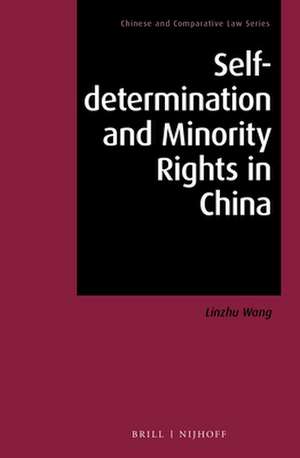Self-determination and Minority Rights in China: Chinese and Comparative Law Series, cartea 7
Autor Linzhu Wangen Limba Engleză Hardback – 19 dec 2018
Preț: 795.15 lei
Preț vechi: 969.70 lei
-18% Nou
Puncte Express: 1193
Preț estimativ în valută:
152.16€ • 162.70$ • 126.86£
152.16€ • 162.70$ • 126.86£
Carte indisponibilă temporar
Doresc să fiu notificat când acest titlu va fi disponibil:
Se trimite...
Preluare comenzi: 021 569.72.76
Specificații
ISBN-13: 9789004380561
ISBN-10: 9004380566
Dimensiuni: 155 x 235 mm
Greutate: 0.57 kg
Editura: Brill
Colecția Brill | Nijhoff
Seria Chinese and Comparative Law Series
ISBN-10: 9004380566
Dimensiuni: 155 x 235 mm
Greutate: 0.57 kg
Editura: Brill
Colecția Brill | Nijhoff
Seria Chinese and Comparative Law Series
Cuprins
Introduction1 Aims and Scope 2 Methodology 3 An Outline of the BookPART 1Self-determinaion in the Chinese Context1 The Nation of China1.1 Pre-modern Chinese Identity 1.2 The Nation of China 1.2.1 Sun Yat-sen and the Nationalism of the Nationalist Party(1) The Republican Era (2) The Nationalist Definition of the Chinese Nation 1.2.2 The Communist Nationalism(1) The Peasant Nationalism (2) The Communist Nation Building: 1949–1978 (3) The Communist Nation Building: 1978 Onwards 1.2.3 The Nation of China1.3 Sovereignty: China’s Perspective (1) The Imperial Understanding of Sovereignty (2) The Modern Concept of Chinese Sovereignty 1.4 Concluding Remarks2 China and the Political Principle of Self-determination2.1 National Self-determination at the Peace Conference of Paris and the Shandong (Shantung) Issue 2.1.1 Conflict in the Former Yugoslavia2.1.2 Japanese and Chinese Positions2.1.3 Consequences of the Conference2.2 Lenin’s Theory of Self-determination and Its Influences upon China 2.2.1 The Nationalist Self-determination2.2.2 The Cpc and Soviet Self-determination(1) The Pre-Long March Period (1921–1934) (2) The Long March Period (1934–1936) (3) The Anti-Japanese War (1937–1945) (4) The Civil War (1946–1949) 2.3 Concluding Remarks3 The Right to Self-determination in the Chinese Context3.1 An Overview of the Right to Self-determination in International Law 3.1.1 Colonial Self-determination3.1.2 Self-determination in the Post-colonial Era(1) Remedial Secession (2) The Right to Self-determination in the Human Rights Context 3.2 The Question of Tibet 3.2.1 The Background3.2.2 Resolution 1353 (1959)3.2.3 Resolution 1723 (1961)3.2.4 Resolution 2079 (1965)3.3 Self-determination in the Situation of Hong Kong and Macau 3.3.1 Hong Kong(1) The Origin of the Issue (2) Hong Kong as a Non-self-governing Territory (3) An Exception to the Colonial Self-determination 3.3.2 Macau3.4 China’s Approach to the Right to Self-determination 3.4.1 Autonomy as a Means of Exercising Internal Self-determination(1) One Country Two Systems (2) Ethnic Territorial AutonomyPART 2Minority Rights in China4 The Regional Ethnic Autonomy Regime4.1 Regions in the REA 4.1.1 Historical Factors4.1.2 The Size of Population4.1.3 Other Factors4.2 Autonomous Agencies 4.2.1 The Local People’s Congress and Local People’s Government4.2.2 Minority Representation in Autonomous Agencies(1) Minorities in the People’s Congress and Its Standing Committee (2) Minority Representation in the LPG (3) Political Reality of Minority Representation 4.3 The Definition of Minorities 4.3.1 The Ethnic Identification Project4.3.2 Problems of the Ethnic Identification Project4.3.3 International Obligations of China in Relation to Minority Recognition(1) ICESCR (2) ICERD 4.4 The Definition of Indigenous Peoples and Indigenous Situation in China 4.4.1 Criteria for Identifying Indigenous Peoples in International Law(1) Defining “Indigenous” (2) The Meaning of “Peoples” (3) The Definition Advocated by China 4.4.2 The Applicability of the Concept of Indigenous Rights in China(1) The Ilo Convention 169 (2) The African Interpretation 4.4.3 Indigenous Peoples in Taiwan4.4.4 Indigenous Small-numbered Peoples in Russia(1) The Ewenki Groups (2) The Hezhe Group (3) The Tuvinians 4.5 Concluding Remarks5 Autonomous Rights under the rea: Legislative and Financial Rights5.1 Legislative Power of Autonomous Agencies 5.1.1 Legislative Power5.1.2 Adaptation Power5.1.3 Adaptive Implementation Power5.2 Autonomous Financial Power 5.2.1 Financial Rights of Autonomous Regions(1) The Local Government’s Own Revenue—Tax income (2) The Local Government’s Own Revenue—Intergovernmental Transfers (3) The Tax Refund (4) The General Financial Transfer (5) The Special Fund 5.2.2 Financial Autonomy of Sub- provincial Autonomous Units5.3 Concluding Remarks6 The Cultural Rights of the Minorities6.1 China’s International Obligations Concerning Minority Rights 6.1.1 Commitments Under The ICESCR6.1.2 State Obligations under the ICCPR6.1.3 State Obligations under the ICERD6.2 The Rights of the Minorities to Culture under Chinese Law 6.2.1 Freedom of Religious Belief(1) Religious Freedom before the 1980s (2) Religious Freedom in Contemporary ChinaInstitutional Religions Minority Belief Systems 6.2.2 The Language Rights of the Minorities(1) Linguistic Planning for the Minorities before the 1980sThe Situation of Minority Languages Minority Writing Systems (2) Language Policy in the New EraLegal Provisions on Minority Languages Language Use in Public Service Language Use in Education Language Use in Business and Other Aspects 6.3 Concluding RemarksConclusion1 China’s Practice of Self- determination and Minority Rights 2 Prospects for Ethnic Territorial Autonomy in ChinaReferences
Notă biografică
Linzhu Wang, Ph.D. (2014), Lancaster University, is a Lecturer in Law at the School of International Law, Southwest University of Political Science and Law. She has published widely in the field of minority and group rights in different languages.








